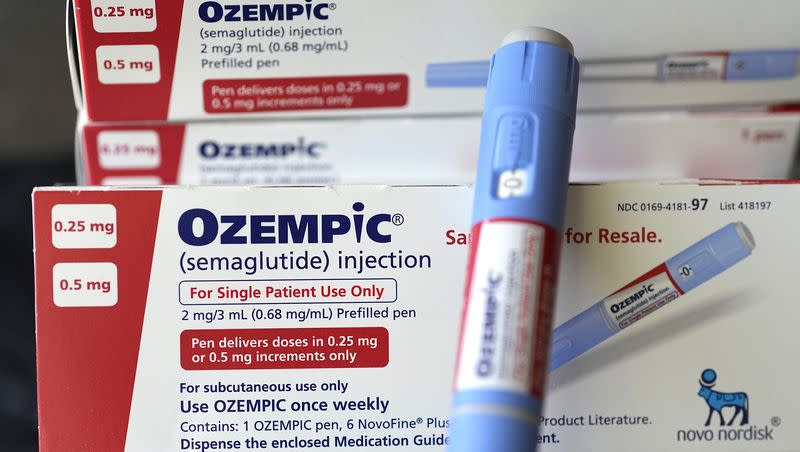What happens when you quit taking Ozempic?

Ozempic, a medication administered by injection for Type 2 diabetes, has faced a prolonged shortage due to an increasing number of individuals using it for its unintended side effect of effective weight loss.
In recent years, drugs designed for treating patients with diabetes have become a staple in the weight loss industry. Known as “the worst-kept secret in Hollywood,” Ozempic and its sister drug, Wegovy, have gained celebrity stardom, making them a hot commodity worldwide.
Related
This trendy medication being used for weight loss might lead to weight gain, doctors say
Wegovy and Ozempic: Is the weight-loss ‘miracle’ real and what are the barriers?
A KFF Health poll found “that nearly half of adults (45%) say they would generally be interested in taking a safe and effective prescription weight loss drug, including nearly 6 in 10 (59%) of those who are currently trying to lose weight and half (51%) of those who are trying to lose less than 10 pounds.”
The medications have created a significant change in the approach to obesity as a chronic illness, yet this comes with expensive repercussions, Axios explained. The debate over the prolonged use of these drugs is largely fueled by the insurers responsible for funding them and the health care professionals who recommend them.
How does Ozempic work?
Semaglutide, the key component in Ozempic and Wegovy, is recognized for its effectiveness in aiding weight loss and managing diabetes. However, its benefits are maintained only while actively used, like other medications. Discontinuing regular semaglutide treatment typically results in the return of the lost weight, experts say.
“Semaglutide works by boosting the body’s level of the hormone glucagon-like peptide 1 (GLP-1). This hormone stimulates the release of insulin. GLP-1 drugs help to lower blood sugar and delay stomach emptying, making people feel full longer,” per Verywell Health.
The Food and Drug Administration does not approve Ozempic for weight loss; it is only approved for diabetes. However, according to U.C. Davis Health, semaglutide, the active compound in Ozempic, is approved for weight loss and marketed under the brand name Wegovy.
“Wegovy is FDA-approved for the treatment of overweight and obesity,” Dr. Rekha Kumar, a New York City-based endocrinologist, told Healthline. “Wegovy contains a higher dose of semaglutide, (2.4 mg), than Ozempic and was developed specifically for the treatment of overweight and obesity.”
Related
What happens when you stop using Ozempic?
Due to the high demand for the drugs, increase in price and lack of insurance coverage, many people have had to quit taking injections.
“When you stop using Ozempic, all of the drug mechanisms at work to help with blood sugar control and weight loss will stop. Your health problems, like Type 2 diabetes or heart disease may worsen and your risk for serious events (like a heart attack or stroke) may increase,” per Drugs.com.
Other things can happen, particularly if you have been using it for weight management:
Your appetite will return
Ozempic can curb your appetite. One of its effects is to slow gastric emptying, which means food stays in your stomach longer, potentially leading to a feeling of fullness or reduced hunger. This effect on appetite is a crucial reason why Ozempic is effective for weight loss in many people.
“I used to be able to eat half a pizza, but now on semaglutide, I take a few bites and feel full,” says Dr. David Shafer, a plastic surgeon at Lenox Hill Hospital and Northwell Health in New York City who takes semaglutide told Everyday Health. “If I miss a dose, my consumption increases as I lose the effect of feeling full.”
Once the medication is stopped, these effects cease, and appetite may return to its previous level, leading to increased calorie intake and potential weight gain.
Weight gain
One of the most common effects of discontinuing Ozempic, especially if used for weight loss, is the potential for weight regain. This is because the drug suppresses appetite and helps regulate blood sugar levels, which can lead to weight loss.
“One year after stopping Ozempic, people gained back two-thirds of the weight they had originally lost. This still resulted in a net weight loss of about 5% from before ever starting Ozempic, per GoodRx.
“People have the most success when they establish a healthy diet and regular exercise habits. In other words, don’t get discouraged or feel like you need to rely on a pill. Establishing a healthy relationship with food and movement is the most important thing you can do to maintain a weight that’s healthy for your body,” GoodRx added.
High blood sugar levels
For those using Ozempic for diabetes management, stopping the medication can lead to a return of higher blood sugar levels.
Ozempic helps to improve the body’s response to insulin and lower blood sugar levels. Without it, individuals may need to adjust their other diabetes management strategies to maintain control over their blood sugar.
“Experts share that people who are not diabetic or obese should not use Wegovy or Ozempic for any reason, including to lose small amounts of weight,” per Healthline.
“Normal-weight patients without diabetes might lose weight if they take GLP-1s, but the risks of the medication outweigh the benefit of weight loss just to be thin versus treating a disease,” Kumar told Healthline. “GLP-1s have not been studied in this population, and we will likely see more side effects with this type of inappropriate use.”

